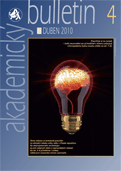Professor Antonín Holý, the discoverer of new antiviral drugs, has died

17 Jul 2012
Israeli Nobel Laureates Visited Prague

30 May 2012
Four laureates of the Nobel Prize from Israel – Ada Yonath (Weizmann Instiute, Rehovot, Nobel Prize 2009), Aaron Ciechaonover (Technion, Nobel Prize 2004), Avram Hershko (Rappaport Institute, Haifa, Nobel Prize 2004) and Dan Schechtman (Technion, Nobel Prize 2011) – visited Prague on the last days of May. They attended the conference Prague Nobel Get-Together at Prague’ National Technical Library (30–31 May), which was jointly arranged by the Institute of Organic Chemistry and Biochemistry of the ASCR, The Academy of Sciences of the CR and the Embassy of the State of Israel in the CR. Besides the Nobel Prize laureates, also other significant personalities from the fields of chemical biology, material sciences and structural biology appeared within this event.
The King of Sweden with a Royal Technology Mission on a Visit of the Academy of Sciences of the CR

10 May 2012
Fast manipulation of a magnet by light

1 Apr 2012
A discovery of Czech physicists published in Nature Physics
A direct transfer of angular momentum from a circularly polarized light to spins allows to excite a magnet from its equilibrium state at sub-picosecond time scales. The discovery, allowing to manipulate spins in a magnet by short laser pulses, was reported by scientists from the joint Laboratory of Opto-Spintronics at the Faculty of Mathematics and Physics, Charles University and the Institute of Physics, Academy of Sciences of the Czech Republic. The work was published on April 1st 2012 in the journal Nature Physics.
Václav Havel in Contemporary History

19 Mar 2012
Syncytin – dobrý sluha, ale zlý pán

24 Feb 2012
Milk Thistle and Green Tea against Cancer

21 Jan 2012
Czech scientists have developed new anti-cancer substances
New possibilities in the treatment of cancer diseases have been opened by a discovery by Czech and Spanish researchers. The team of prof. Vladimír Křen from the Institute of Microbiology (MBÚ) of the ASCR along with the team of prof. Jitka Ulrichová from the Faculty of Medicine of Palacký University in Olomouc and with scientists from Universidad de Málaga in Spain have developed new derivatives with antiangiogenic activity on the basis of silybin ‒ substances obtained from milk thistle (Silybum marianum).
White Nose Syndrome: Can Czech Bats Help American Bats?

20 Jan 2012
An Article by Czech Scientists in the Journal of Wildlife Diseases
Scientists from Moravian workplaces have proved that bats here suffer from white-nose syndrome, a fungal disease that is threatening the ecosystem in North America. In the Czech Republic as well as in other parts of Europe, bats with this syndrome die only very rarely and the disease has not yet caused a decline in the population numbers. Uncovering the cause of ‘European immunity’ could save North American bats and avert also the disruption of the biological balance in that part of the world.
My Meeting with Václav Havel

20 Dec 2011
New Laboratories for Polymer Research Named after Otto Wichterle

4 Nov 2011
The scientists of the Otto Wichterle Centre of Polymer Materials and Technologies (CPMT OW) Institute of Macromolecular Chemistry (ÚMCH) of the Academy of Sciences of the CR are beginning to work in new laboratories. They were ceremonially opened on Thursday, 3rd November 2011 within the Open House Days of the Institutes (3–4 November), which are in the programme of the Science and Technology Week (STW) festival. On this occasion, the director of the institute František Rypáček emphasised the fundamental importance of polymers for modern man. They have penetrated into electronics, pharmacy and medicine and are becoming indispensible for us.




